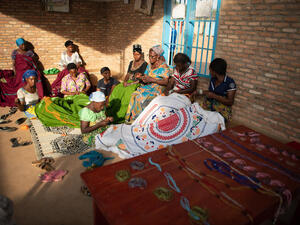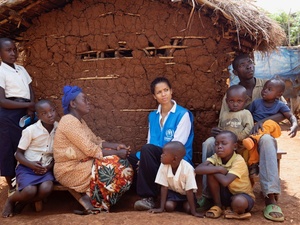UNHCR steps up support in Burundi as record numbers return
UNHCR steps up support in Burundi as record numbers return

A UNHCR staff member visits a returnee family in a house built with UNHCR assistance in north-east Burundi.
SHOZA, Burundi, December 15 (UNHCR) - This has been a phenomenally busy year for the UN refugee agency in Burundi, with almost 100,000 refugees returning home and stepped up support aimed at easing their reintegration in the small landlocked country after years of exile.
Some 94,000 refugees have returned to Burundi since January, more than in any other year since UNHCR launched its voluntary assisted repatriation programme in 2002. Most have come back from Tanzania, which is in the process of consolidating and closing refugee camps along the Burundian border.
Although the general situation has improved in Burundi over the years, the returnees face considerable challenges with reintegration. But UNHCR has been able to give many of them a leg up over the past year thanks to funding from various donors, including the European Union (EU).
Thanks to support from the EU's European Development Fund, UNHCR has handed over more than 6,000 additional shelter kits to returnees and strengthened programmes aimed at monitoring their welfare and resolving problems over land, a serious issue in a country with limited space.
The impact of the aid was visible during a recent visit by European Commission representatives to the Shoza community in north-eastern Burundi. Cheers went up as a house built from one of the shelter kits was handed over to a family of seven, who returned a few months back after 13 years in a Tanzanian camp.
"Our situation here in Burundi was really precarious. We lived in a hut which I had built and covered with plastic sheeting, but it was far too small. Our children did not have enough space to sleep," said the family patriarch, 35-year-old Josaphat Ndimurwanko. With the building materials provided under the UNHCR project, he built a small brick house with a corrugated iron roof. "Now the children are well and healthy," a smiling Ndimurwanko added.
"Our shelter project is about human dignity," said Prosper Ndumuraro, a UNHCR field assistant who helped the family. "Having a small house means a lot to the returnees.... It gives them a sense of dignity. It also makes an enormous difference for their health, especially for the children."
The EU representatives, accompanied by UNHCR staff and government officials, were also able to gain a good insight about the pressures and challenges that the influx of returnees is creating in Burundi, one of the world's poorest countries.
Shoza lies in a high-return area of Muyinga province, which has benefited from the additional support for reintegration activities. One out of three people in the district around Shoza is a returnee and that has put considerable strain on the health and education services. There is also greater demand for building materials.
And land is often an issue. Many former refugees find their houses destroyed and, in some cases, their land occupied. In an economy where more than 90 percent of the population is dependent on subsistence agriculture, people without land cannot provide food for their families.
To address this problem, UNHCR this year expanded a programme aimed at resolving arguments over land. Returnees have welcomed this opportunity to solve conflicts with the help of mediators and legal experts, which often leads to a compromise solution. It is quicker than going through the courts.
UNHCR, through the local Ligue Iteka human rights organization, has also expanded a programme to monitor the situation of returnees. This enables UNHCR to respond quickly in cases where the protection of returnees is compromised.
The reintegration project also includes partnerships with the UN Children's Fund (UNICEF) to build new schools in return areas and with the World Health Organization (WHO) to improve access to medical services for returnees. Meanwhile, EDF will continue to support UNHCR's reintegration work in 2009.
By Andreas Kirchhof in Shoza, Burundi









